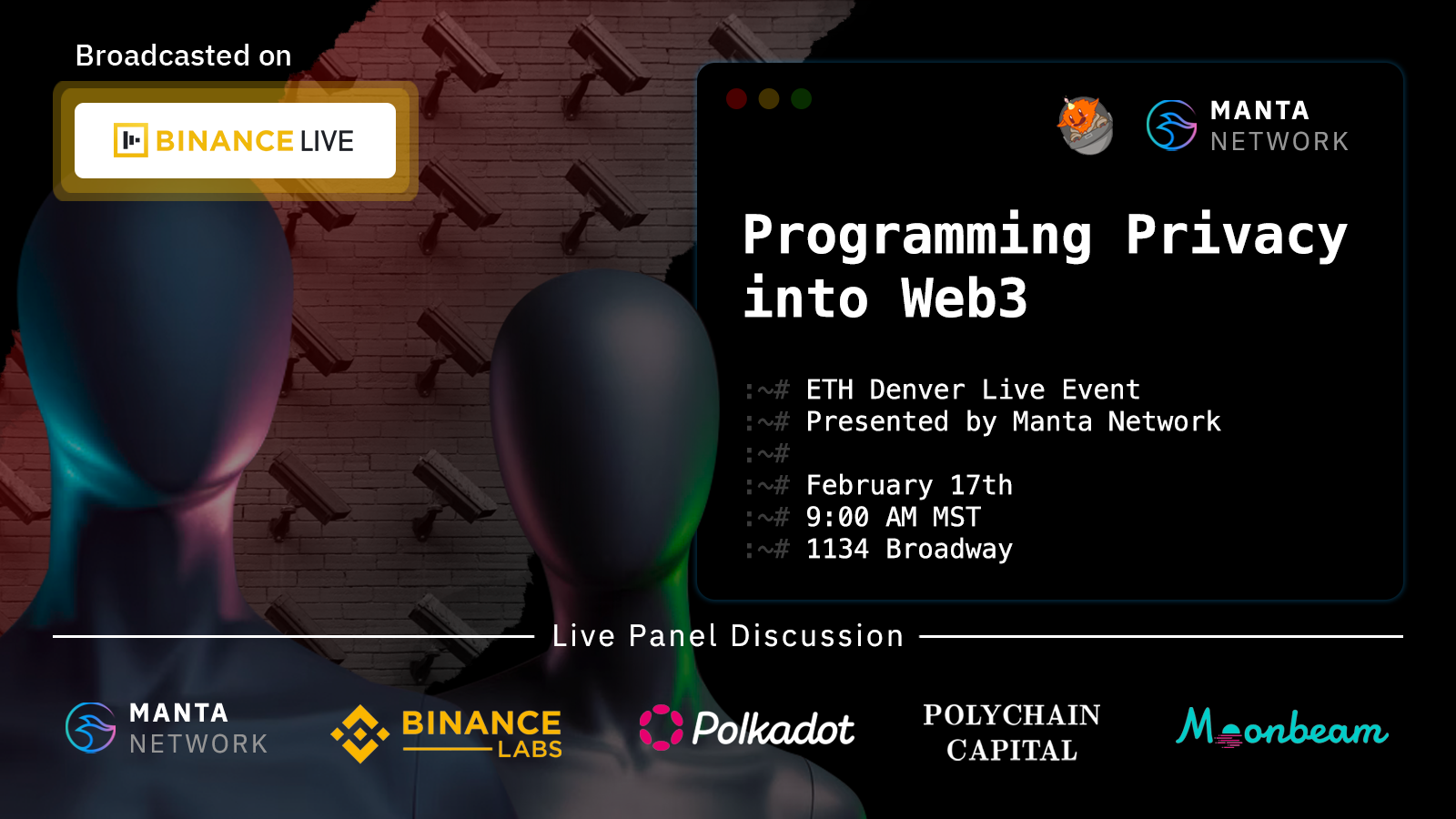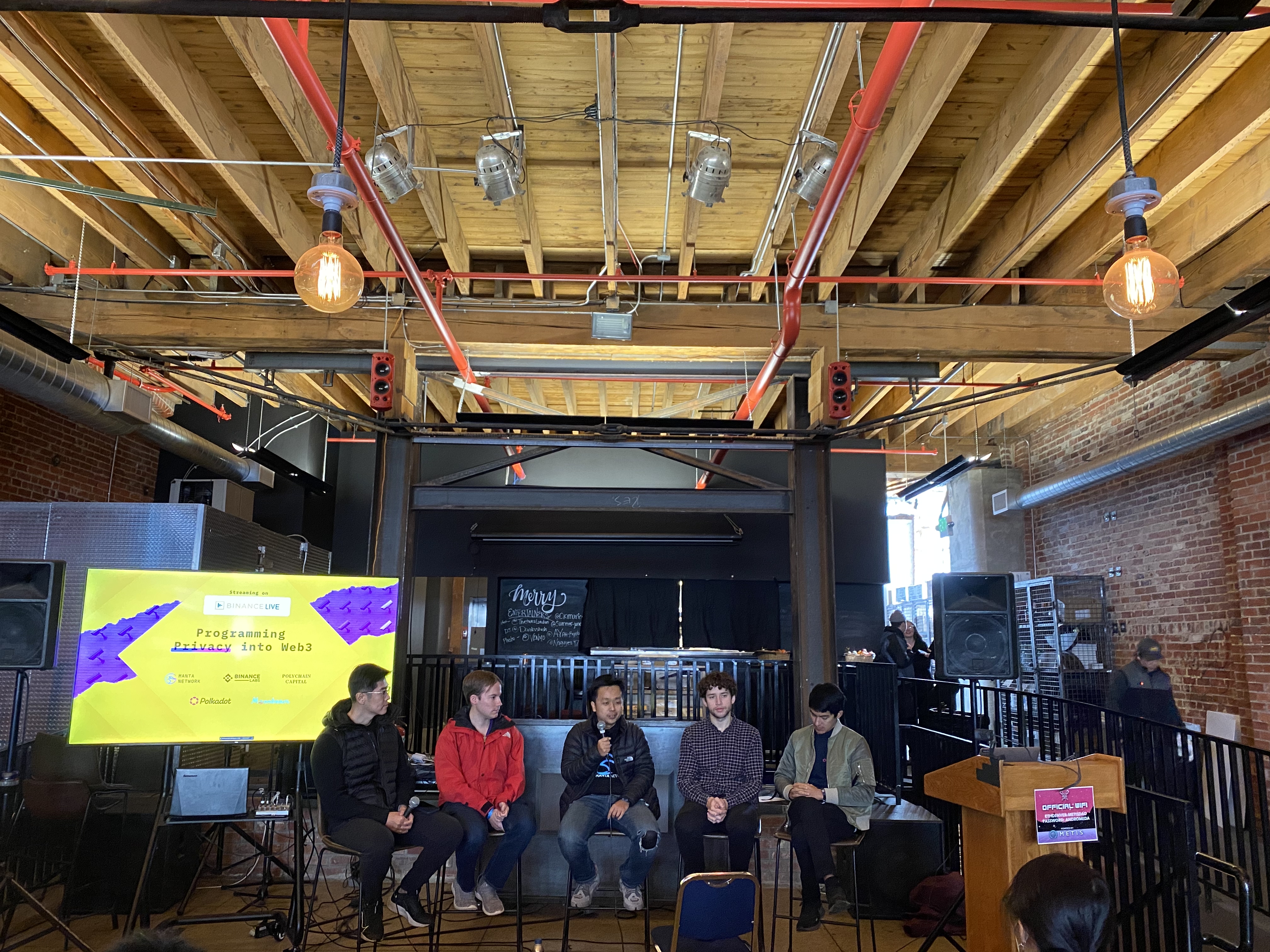At 00:00 on February 18th, Beijing time, Manta Network held an offline meetup during ETHDenver, shared the latest project progress, and talked with guests from Parity, Moonbeam, and Polychain about the hot topic - Web3 privacy.

Moderator of the round table: Manta core contributor Kenny Li Guests (from left to right in the picture):
Kevin Neilson,Moonbeam Core Engineer
Shumo Chu, Manta co-founder
Luke Pearson,Polychain cryptography research expert
Shawn Tabrizi,Parity core developer

The following are the views of the guests:
Q1: How do you see the role of privacy in Web3? Do you think it is important? Or is it not that important?
Shawn
Privacy is a basic human right, and of course it is of paramount importance. Everyone will want privacy, and privacy will gradually be integrated into the design of decentralized systems. We originally had the blockchain for public verifiability, and the easiest way to do that is to show everything on the chain. But with the development of technology and the increase of our understanding of the blockchain field, we can gradually increase the function of the privacy layer while maintaining the characteristics of the blockchain.
Privacy is the most fundamental and urgent need. I believe we will realize it slowly, and teams like Manta are also constantly advancing.
Luke
Privacy is not a fantasy. If we want privacy, we must start now. Privacy is paramount to the next step forward in blockchain. If there is no privacy, many things can not be done.
Shumo
I will talk more from a technical point of view. I did my Ph.D. in computer science, and when I first saw blockchain, it was very interesting: there is a huge gap between people's perception of blockchain privacy and the actual situation. I believe that most of the people on the scene are Web3 believers, we believe that the blockchain will be the future, but at the same time think about the working principle of the public ledger. Many people think that cryptocurrency is so advanced that it must be private, but on the contrary, "like transferring money on Twitter", this is also a metaphor I often use. Your most important asset information is public on-chain, and always will be, because information on the blockchain is immutable.
Back to real applications, people need to make a trade-off between privacy and ease of use. Now, the adoption of private transactions may encounter problems such as slow speed and high gas fees, which are the main obstacles in the popularization of privacy. What Manta wants to do is to provide a technology and product to lower the threshold of privacy, so that you don't need to make a lot of trade-offs.
Kevin
People tend to go with the default option, and I think people will be willing to adopt it if there is an easier and easier privacy solution. People may not care about privacy now, but 5-10 years later, it is a very scary thing to be able to connect with you based on your transaction history on the chain.
Q2: Since privacy is so important, why hasn't people paid attention to it?
Shumo
I will still speak from a technical point of view. If you think from first principles, private transactions should not consume more gas, and should also be more usable.
The first angle is user experience. A big problem with existing privacy products is the lack of application scenarios. For example, Zcash is a single-asset anonymous protection transfer protocol. Now the entire Web3 world is moving forward, and people want to play DeFi, GameFi, and Metaverse. How to embed privacy into these apps? This is one aspect. Secondly, at the current stage of development of zero-knowledge proof, on-chain operations are not efficient enough. But I am very optimistic about the entire ZK field. There are many smart people all over the world working together to solve the efficiency problem in the zero-knowledge proof system.
Luke
The emergence of companies like Signal and DuckDuck Go (a privacy search engine company) is not unexpected. But little is known about their existence.
I think people still know too little about the meaning of privacy, and we need more vivid and contextualized popular science explanations. I like zkSNARK very much, and I am very lucky to have studied it for three years. I am currently doing research with the Manta team.
I hope that in the future, privacy and scalability can be achieved in parallel. Otherwise, it will be difficult for people to understand the role that privacy can play.
Shawn
My opinion is that many privacy technologies are still in the stage of innovation and research. In many development languages, it is difficult for developers to find a good development library, and naturally it is more difficult to develop.
In addition, the blockchain field is still pursuing faster speed and lower transaction costs. Privacy features and scalability are competing. For private transactions or zero-knowledge proofs, the gas fee will increase. The status quo of this ecology is like this: everything is expanding, and it seems that there are not so many blocks that can accommodate private transactions. But with the development of technology, the bottom layer of the blockchain can accommodate more transactions and support more projects, and privacy will be more adopted at that time.
Q3: In the next 3-5 years, if the problems mentioned by everyone are solved, what is the privacy application scenario you are most looking forward to?
Shawn
As I just said, privacy is an essential part of life. Voting is a good example. If you fear that your vote will be made public and get some pressure because of it, then the whole election/voting system is failing. The most exciting thing about the ZK field is that you don't even realize that you need it, but there are these technologies behind it.
Luke
I think DeFi is a great example that can generate many different application scenarios. In some DAOs, with privacy, people's voting results are private, so that the results will not be affected by some individual preferences. Another important area is gaming.
Going back to zero-knowledge proof, it can prove the truth of a statement without revealing other information besides the statement. For example, if you want to participate in an event of ETHDenver, but you must hold a certain NFT to enter, but you don't want to disclose all the assets on the wallet, then you can use zero-knowledge proof.
Users have access to control all information displayed, and I think this can lead to a lot of exciting products.
Shumo
The best application scenarios for privacy in the blockchain field have certainly not yet been discovered. That's why Web3 always surprises me. Recently, there was a Constitution DAO who wanted to buy a copy of the US Constitution. Of course they ended up losing to a hedge fund. If the auction process is private, similar situations will be reduced a lot. If you think DAOs are the organization of the future, then privacy can play a big role.
Kevin
One thing that excites me about Manta is that it is a one-stop shop. In the future, there will be a series of privacy products. As an individual user, I am very concerned about the privacy of my personal address, and sometimes I avoid certain Dapps or exchanges. I believe that as the number of decentralized applications and users increases, more and more people like me will worry about privacy.
Q4: There are many privacy products in the Web3 world, such as ZCash, Monero, Dashes and Tornado Cash on Ethereum. I am curious, which ones have you used? What do you think can be improved?
Shawn
I haven't used ZK products yet, although I do hold ZCash myself. I discovered a long time ago that ZCash is not what I imagined it to be. When you transfer money, it is not anonymous by default, which is very strange, because I have no other reason to use it other than anonymity.
Luke
I feel the same way, ZCash feels like an anonymous version of Bitcoin, which is old-fashioned, but not programmable. I just mentioned Tornado Cash, you can use Tornado Cash to withdraw coins anonymously, but in fact there is no privacy, just anonymity. Tornado Cash Nova will increase privacy. Although you can't see the account, you can still see the amount, which is also a problem.
Programmable smart contracts can truly empower governance, taxation, NFT, etc. These are also areas where privacy will enter in the future.
Kevin
You get some Monero from an exchange, and you transfer it to your own wallet, and then you transfer it to a friend's wallet, and you'll find the process very challenging. It's very difficult if you don't have a technical background. Existing privacy solutions still have a long way to go in terms of ease of use.
Kenny
Sometimes, not to mention transferring money, long-term blockchain users like me have to be very careful to copy the address three or five times to avoid mistakes.
Q5. Do you think privacy will be applied in the DAO field in the future? Still think DAO should be fully transparent?
Shawn
This is a very interesting topic, DAO should have privacy when needed, and avoid privacy when not needed. Some organizations want to have the platform of public figures, and they need influential people to express their opinions on some topics. But some votes were the exact opposite. Not everything needs privacy, we have to use it where appropriate. The most important thing is to make sound decisions, not to apply them blindly.
About Calamari Networkhttps://www.binance.com/en/live/video?roomId=2101006
About Calamari Network
Telegram Chinese: https://t.me/mantanetwork_zh
About Manta Network
Manta Network is committed to building a better Web3 world through privacy protection. Manta's product design starts from first principles, and provides end-to-end privacy protection for blockchain users through leading cryptographic architectures such as zkSNARK. While protecting privacy, Manta is interoperable, convenient, high-performance and auditable, allowing users to conduct private transfers and transactions between any parachain assets. Manta's vision is to provide more convenient privacy protection services for the entire blockchain world.
Manta's founding team consists of several cryptocurrency veterans, professors, and academics whose experience includes Harvard, MIT, and Algorand. Manta’s advisors include Hypersphere Ventures co-founder Jack Platts, Polychain partner Tekin Salimi, former Web3 Foundation co-founder Ashley Tyson, Consensys’ Shuyao Kong.
Manta's investment institutions include Polychain, ParaFi, Binance Labs, Multicoin, CoinFund, Alameda, DeFiance, and Hypersphere, etc. Manta is also a grant recipient of Polkadot's official Web3 Foundation, a member of the Substrate Builder Program, and a member of the Berkeley University Blockchain Accelerator.
Follow the official channel for more information about Manta/Calamari:
Manta:https://manta.network/
Calamari:https://calamari.network/
Github:https://github.com/Manta-Network
Twitter:https://twitter.com/MantaNetwork
Medium:https://mantanetwork.medium.com/
Telegram:https://t.me/mantanetwork
Telegram Chinese: https://t.me/mantanetwork_zh
Discord:https://discord.gg/ZtSuSKRy8X